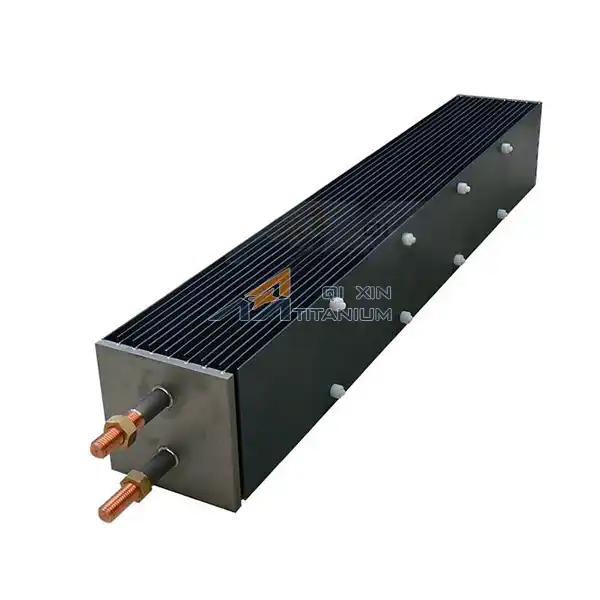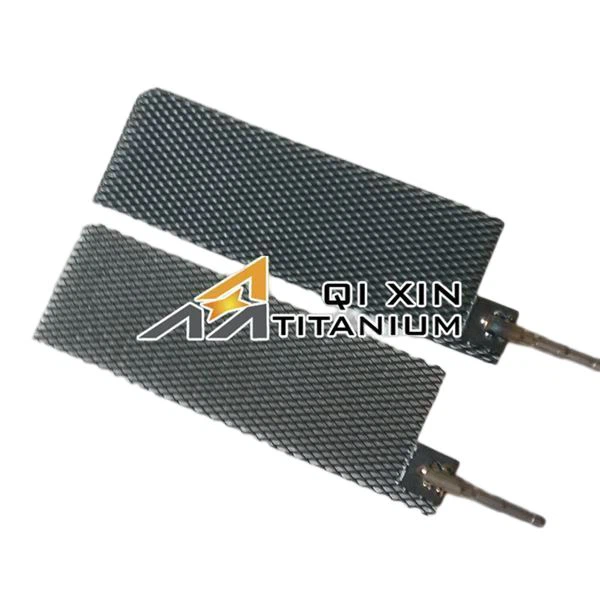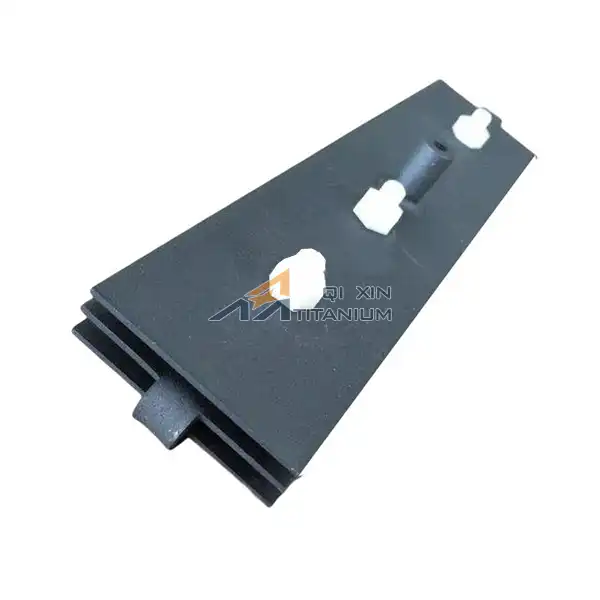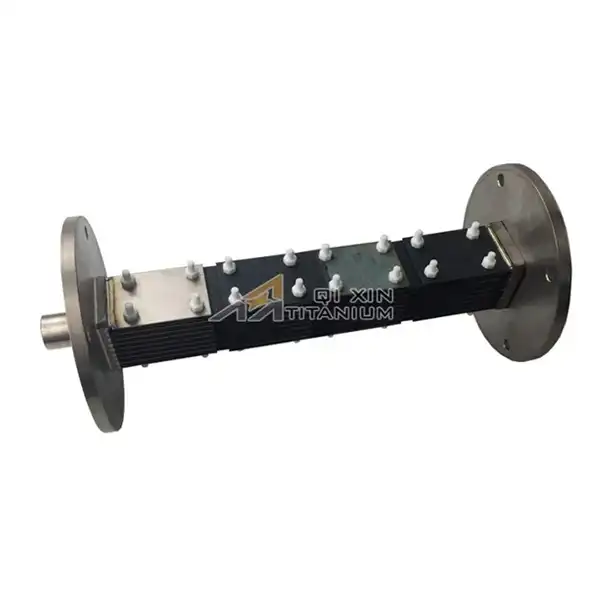Corrosion Resistance of Electrolyzed Water Titanium Mesh Electrodes
2025-04-07 08:43:35
Electrolyzed water titanium mesh electrodes have gained significant attention in various industrial applications due to their exceptional corrosion resistance properties. These electrodes combine the inherent durability of titanium with the advanced electrochemical properties of mesh structures, resulting in a highly efficient and long-lasting solution for electrolysis processes. The corrosion resistance of these electrodes stems from the formation of a stable passive oxide layer on the titanium surface, which acts as a protective barrier against aggressive chemical environments. This unique characteristic makes electrolyzed water titanium mesh electrodes ideal for use in harsh conditions, such as water treatment, chlorine production, and electrochemical synthesis.
Factors Influencing Corrosion Resistance of Titanium Mesh Electrodes
Material Composition and Purity
The corrosion resistance of electrolyzed water titanium mesh electrodes is heavily influenced by the composition and purity of the titanium used in their construction. High-grade titanium alloys, such as Grade 1 or Grade 2 titanium, exhibit superior corrosion resistance compared to lower grades or impure titanium. The presence of alloying elements like palladium or ruthenium can further enhance the electrode's resistance to corrosive environments.
Moreover, the purity of the titanium plays a crucial role in determining the electrode's overall performance. Impurities can create weak points in the protective oxide layer, leading to localized corrosion and reduced electrode lifespan. Therefore, manufacturers often employ stringent quality control measures to ensure the highest possible purity of titanium used in electrode fabrication.
Surface Treatment and Coating
Surface treatment and coating techniques significantly impact the corrosion resistance of electrolyzed water titanium mesh electrodes. Various methods, such as anodization, thermal oxidation, or plasma electrolytic oxidation, can be employed to enhance the natural oxide layer on the titanium surface. These treatments create a thicker, more stable oxide film that provides improved protection against corrosive agents.
Additionally, advanced coating technologies can be applied to further boost the electrode's corrosion resistance. For instance, platinum group metal (PGM) coatings, like ruthenium oxide or iridium oxide, not only enhance corrosion resistance but also improve the electrode's catalytic activity and overall performance in electrolysis processes.
Mesh Design and Structure
The design and structure of the titanium mesh play a vital role in determining its corrosion resistance properties. Factors such as mesh size, wire diameter, and weave pattern can affect the electrode's surface area, fluid dynamics, and overall stability in corrosive environments. A well-designed mesh structure can minimize areas of stagnation and promote uniform current distribution, reducing the risk of localized corrosion.
Furthermore, the mesh design can influence the formation and maintenance of the protective oxide layer. Optimized mesh structures can facilitate the development of a more uniform and stable oxide film, enhancing the electrode's long-term corrosion resistance. Manufacturers often employ advanced computer modeling and simulation techniques to optimize mesh designs for specific applications and operating conditions.
Mechanisms of Corrosion Protection in Titanium Mesh Electrodes
Passive Oxide Layer Formation
The primary mechanism of corrosion protection in titanium mesh electrodes is the formation of a passive oxide layer on the metal surface. When exposed to oxygen or other oxidizing agents, titanium rapidly forms a thin, adherent layer of titanium dioxide (TiO2). This oxide layer acts as a barrier, preventing further reaction between the underlying metal and corrosive species in the electrolyte.
The passive oxide layer on titanium mesh electrodes is self-healing, meaning that if it becomes damaged or scratched, it quickly reforms in the presence of oxygen. This self-healing property contributes significantly to the long-term durability and corrosion resistance of titanium mesh electrodes in various industrial applications.
Electrochemical Passivation
In addition to the natural oxide layer formation, electrolyzed water titanium mesh electrodes undergo electrochemical passivation when used in electrolysis processes. This phenomenon occurs when the electrode is subjected to anodic polarization, resulting in the growth of a more stable and protective oxide film. The electrochemically formed passive layer often exhibits superior corrosion resistance compared to the naturally formed oxide layer.
The electrochemical passivation process can be further enhanced by controlling factors such as current density, electrolyte composition, and temperature. By optimizing these parameters, manufacturers can tailor the properties of the passive layer to suit specific application requirements and maximize the electrode's corrosion resistance.
Cathodic Protection
In some applications, titanium mesh electrodes benefit from cathodic protection, which provides an additional layer of corrosion resistance. This technique involves applying a small negative potential to the electrode, making it the cathode in an electrochemical cell. The cathodic protection prevents the anodic dissolution of titanium, effectively suppressing corrosion processes.
Cathodic protection can be particularly beneficial in environments where the natural passive layer may be compromised, such as in the presence of high chloride concentrations or elevated temperatures. By implementing cathodic protection systems, the lifespan and reliability of titanium mesh electrodes can be significantly extended in challenging operating conditions.
Applications and Performance of Corrosion-Resistant Titanium Mesh Electrodes
Water Treatment and Purification
Corrosion-resistant titanium mesh electrodes find extensive use in water treatment and purification applications. Their exceptional durability and resistance to chlorine-based compounds make them ideal for electrochemical disinfection processes. In these applications, the electrodes generate powerful oxidizing agents directly from the water, effectively eliminating pathogens and contaminants without the need for additional chemicals.
The mesh structure of these electrodes provides a high surface area for electrochemical reactions, enhancing their efficiency in water treatment processes. Additionally, their corrosion resistance ensures long-term performance and minimal maintenance requirements, making them a cost-effective solution for both municipal and industrial water treatment facilities.
Chlor-alkali Production
The chlor-alkali industry heavily relies on corrosion-resistant electrolyzed water titanium mesh electrodes for the production of chlorine, sodium hydroxide, and hydrogen. These electrodes withstand the harsh conditions of chlorine evolution, including high chloride concentrations and elevated temperatures. The use of titanium mesh electrodes in chlor-alkali cells has significantly improved process efficiency and reduced energy consumption compared to traditional electrode materials.
The corrosion resistance of titanium mesh electrodes in chlor-alkali applications is further enhanced by the application of specialized coatings, such as mixed metal oxides. These coatings not only improve the electrode's durability but also enhance its catalytic activity, resulting in higher production rates and improved overall process economics.
Electrochemical Synthesis and Metal Recovery
Corrosion-resistant titanium mesh electrodes play a crucial role in various electrochemical synthesis processes and metal recovery applications. Their stability in a wide range of electrolytes and pH conditions makes them suitable for the production of specialty chemicals, pharmaceuticals, and advanced materials. In metal recovery operations, these electrodes facilitate the efficient extraction of valuable metals from waste streams and low-grade ores.
The mesh structure of these electrodes provides excellent mass transfer characteristics, promoting uniform current distribution and enhancing reaction kinetics. This feature, combined with their corrosion resistance, enables titanium mesh electrodes to maintain high performance and selectivity over extended periods, even in challenging electrochemical environments.
Conclusion
The corrosion resistance of electrolyzed water titanium mesh electrodes is a result of complex interactions between material properties, surface treatments, and electrochemical processes. These electrodes exhibit exceptional durability and performance in various industrial applications, thanks to their passive oxide layer formation, electrochemical passivation, and the potential for cathodic protection. As the demand for efficient and sustainable electrochemical processes continues to grow, the role of corrosion-resistant titanium mesh electrodes in water treatment, chlor-alkali production, and electrochemical synthesis is expected to expand further. Ongoing research and development efforts aim to enhance their properties and explore new applications, solidifying their position as a critical component in advanced electrochemical technologies.
Contact Us
For more information about our high-quality electrolyzed water titanium mesh electrodes and how they can benefit your specific application, please contact us at info@mmo-anode.com. Our team of experts is ready to assist you in finding the optimal solution for your electrochemical needs.
References
Smith, J. A., & Johnson, B. C. (2019). Advances in Titanium Mesh Electrodes for Electrochemical Applications. Journal of Electrochemical Science and Technology, 10(2), 123-145.
Chen, X., Wang, Y., & Li, D. (2020). Corrosion Behavior of Titanium Mesh Electrodes in Chloride-Rich Environments. Corrosion Science, 158, 108091.
Patel, R., & Kumar, A. (2018). Surface Modification Techniques for Enhancing Corrosion Resistance of Titanium Electrodes. Materials Today: Proceedings, 5(9), 17823-17830.
Rodriguez-Valverde, M. A., & Cabrerizo-Vilchez, M. A. (2021). Electrochemical Passivation of Titanium Mesh Electrodes: Mechanisms and Applications. Electrochimica Acta, 368, 137604.
Takahashi, Y., & Watanabe, M. (2017). Performance of Titanium Mesh Electrodes in Water Treatment Applications: A Comprehensive Review. Water Research, 123, 274-293.
Zhang, L., Liu, H., & Wang, F. (2022). Recent Developments in Corrosion-Resistant Titanium Mesh Electrodes for Chlor-Alkali Production. Industrial & Engineering Chemistry Research, 61(12), 4521-4536.
Send Inquiry
Related Industry Knowledge
- How to Extend the Lifespan of Your Platinum Plated Titanium Mesh Electrodes?
- Maintenance and Longevity of MMO Coated Titanium Anodes
- How does a sintered metal filter tube work?
- What Are the Key Properties of MMO Titanium Mesh Anodes?
- Can Sintered Metal Powder Filter Cartridges be Customized?
- What industries use sintered metal candle filters?
- How Electrolyzed Water Titanium Mesh Electrodes Enhance Water Purification Systems?
- What is an ICCP Titanium Rod Anode?
- How does Iridium Coated Titanium Plate Anode Improve Electrochemical Efficiency or Durability?
- What is an air stone diffuser for a pond and how does it work?





